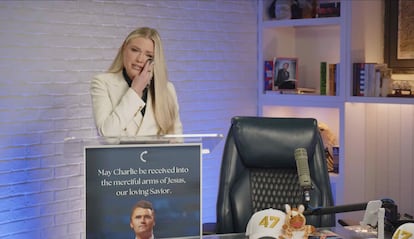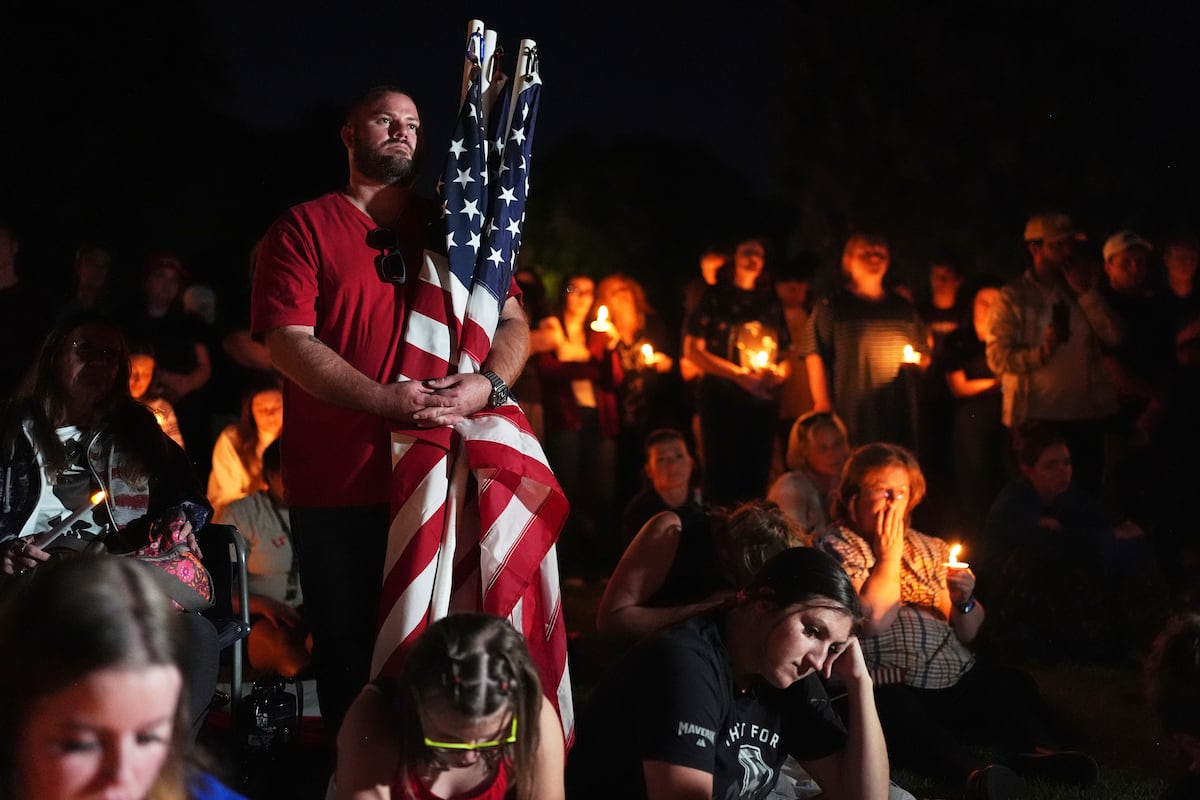In one of the pinnacles of rhetorical art in the United States, president Abraham Lincoln called for the country’s reconciliation in his first inaugural address in 1861, invoking a powerful image: “The mystic chords of memory” of what once united his fellow citizens, he said, would resound again when touched “by the better angels of our nature.” Five weeks later, the Civil War broke out. In 1865, Lincoln became the first of four U.S. presidents to be assassinated in the nation’s history.
Donald Trump’s speech when he first assumed the presidency in 2017 will be remembered for its grim rhetoric and two words: that day, he promised, in the same apocalyptic tone he had used during the campaign, would mark the end of “American carnage.”
On Friday, Lincoln’s “better angels” were invoked by Utah Governor Spencer Cox. He did so at a press conference, where he confirmed that the alleged killer of ultraconservative activist and MAGA leader Charlie Kirk — a 22-year-old named Tyler Robinson — had turned himself in.
Cox, who called for reconciliation and warned against social media — a “cancer on our society” — evoked Lincoln roughly an hour after Trump, on Fox News, promised that the “radical left” would pay for Kirk’s death. Kirk had been a close ally of Trump and a key factor in his strong performance among young voters in the 2024 election. Trump also called for the death penalty for the killer and ignored Democratic victims of the recent surge in political violence in the United States — a list that includes the two assassination attempts Trump survived last summer.
In one of those moments of mourning meant to inspire unity, Trump and his main allies chose instead to turn it into a new argument for the political persecution of their opponents: they announced retaliation against the so-called “radical left” — to which early evidence does not link Robinson, who was raised in a Republican household and was a gun enthusiast in Utah — and promised purges of officials, as well as threats against foreign citizens who might celebrate or justify Kirk’s death. The 31-year-old MAGA activist was a controversial figure for his staunch defense of gun rights; xenophobic, Islamophobic, and anti-LGBTQ+ rhetoric; and his involvement in an exclusionary Christian nationalism.
Millions of followers
Kirk was also an extraordinarily influential figure, not only in the United States and not only in life: his accounts, and those of Turning Point, the conservative advocacy organization he founded at just 18, have gained millions of followers since a bullet fired from a hunting rifle struck him in the neck during an outdoor debate event on the Utah Valley University campus.
 Erika Kirk during her message published on September 12, 2025.Turning Point Usa (EFE)
Erika Kirk during her message published on September 12, 2025.Turning Point Usa (EFE)
His widow, Erika Kirk, remembered her husband on Friday with a speech in which she extended blame beyond Robinson, who, according to authorities, acted alone. She said that “the evildoers responsible” for her husband’s murder “have no idea what they’ve done.” “They killed Charlie because he preached a message of patriotism, faith, and God’s merciful love. If you thought my husband’s mission was powerful before, you have no idea. You have no idea what you just have unleashed across this entire country, and this world.”
The following day, it was announced that Kirk’s funeral will take place next Sunday in a stadium in Glendale, Arizona, near the home of his wife and two children. The stadium has a capacity of 63,000, and Trump has confirmed he will attend.
Kirk’s death has once again highlighted the deafening divide between the two Americas. Republicans blame Democrats for the climate of tension that led to his murder — or even for the murder itself, as South Carolina Representative Nancy Mace suggested in a meeting with reporters at the foot of the Capitol.
Democrats, for their part, insist that the problem comes from both sides, and that Trump bears responsibility for the confrontational rhetoric that floods public discourse in the United States, amplified by social media. Elon Musk, owner of one such platform, X, posted last week that “the left is the party of murder.”
Given the current situation, legislators on both sides of the aisle seem to agree on only two things: concern for their personal safety and anxiety about participating in public events.
Liberal columnist Ezra Klein defended Kirk on Friday, adopting a conciliatory tone, praising the activist’s “right way” of doing politics and highlighting his willingness to talk “with anyone” in the university debates he organized across the country — the very type of events where he ultimately lost his life in Utah.
Meanwhile, the progressive side of the Democratic Party stresses that mourning his death is not the same as celebrating his life, as Elisabeth Spiers writes in The Nation, and insists that the left should not fall into the trap of “moral superiority.”
Dozens, possibly hundreds, of people have been fired by private companies for making comments celebrating or excusing the murder. A website called Expose Charlie’s Murderers encourages reporting citizens who celebrated the crime. It also promises that the site — a true monument to doxing — “will soon be converted into a searchable database of all 30,000 submissions, filterable by general location and job industry.” It adds: “This is a permanent and continuously-updating archive of Radical activists calling for violence.”
Amid the fierce debates that have emerged in recent days, one issue has been surprisingly sidelined: gun control. Perhaps because the country — or at least the part of it advocating for a broad interpretation of the Second Amendment — has lost hope of effecting change. Or perhaps because on the same day Kirk, a staunch supporter of that amendment, died, there was also a school shooting in Colorado. A 16-year-old boy, “radicalized by an extremist network,” according to investigators, shot two classmates, leaving them in critical condition.
David Corn, columnist for the left-leaning Mother Jones and a theorist of the MAGA movement, noted in his newsletter on Saturday that there are an estimated 500 million firearms in civilian hands in the United States. “There are an estimated 500 million civilian-owned guns in the United States. There are 340.1 million people in America. It only takes 0.00000029 percent of the population — one person — with one of those half-billion guns to change our world,” he argued.
“We cannot prevent every extremist or deranged person bent on killing from doing so. We certainly can institute gun safety measures and firearms restrictions and provide more and better social services to those in need,” Corn continued. “We can also try to adjust the tenor of our politics to counter or restrain the accelerants of violence.”
In short, to make Lincoln’s famous “better angels” once again touch the “mystic chords of memory.” Those angels are in short supply in today’s America.
Sign up for our weekly newsletter to get more English-language news coverage from EL PAÍS USA Edition
